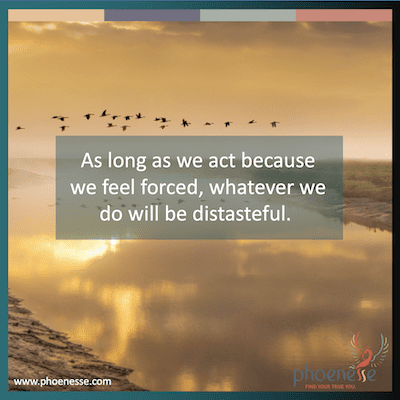
As long as we act because we feel forced, whatever we do will be distasteful.
Our true nature operates for the sake of fulfillment and creating a meaningful life. And really, isn’t that our deep desire? But then something goes sideways in life. And we are suddenly torn into comparing ourselves with others, and we begin using our ambition in the wrong way. If we were to use our initiative in a proper, realistic way, we would discover that it’s actually self-activating. It is self-generating. It operates from an inner need to establish our own sense of integrity and find our own inner strength. Proper self-discipline then does not operate in order to impress or prove something to others.
Unfortunately, when we shy away from becoming our best self—because somewhere hidden inside we don’t want to become the truest version of ourselves—our ambition goes wonky. As a result, we go overboard and wind up in extremes of over-ambitiousness and under-ambitiousness.
The key lies in finding the areas were we still act only because we have to, but actually don’t want to; where we hinge our actions on someone else, and not on ourselves. When such areas are seen and explored and understood, our inner conflicts will stop.
The truth about self-discipline
These conflicts stem from seeing discipline as being unpleasant. And in fact, as long as we summon discipline because we must—because life and authority demands it of us—it will be unpleasant.
As long as we do it because we think there’s no other way and we have to, we are then constantly obeying some authority but with the brakes on. And occasionally, we will really rebel and we won’t do anything. We will let ourselves go and become destructive.
On the other hand, when discipline becomes a freely chosen act, it’s not a burden. It actually becomes pleasurable. So when something is freely chosen, it is pleasurable, but when we do something because we must, it is horrible.
Once something becomes pleasurable, it’s no longer a discipline.
It’s not the act, then, that is either pleasurable or unpleasant, desirable or not desirable. It’s the auspices under which we are doing it. Always. Indeed, the supposedly most pleasurable act, if we are forced into it, will become distasteful to us.
The main point is, once something becomes pleasurable, it’s no longer a discipline. At the beginning, of course, we choose it, even though at the moment it may not be a barrel of monkeys. Nonetheless, we choose it out of fairness, out of reason, out of decency, out of our own self-interest, and also in the interest of others.
The trick is to find our inner motivation to do something, not because it is imposed on us, but because we choose it. And in that choosing, when we do it again and again, it stops being necessary to use discipline. Then, even while it is a discipline, it is a free act.
As long as we act because we feel forced, whatever we do will be distasteful. And this leads to feelings of rebellion, hostility and hate, which cascades into guilt. As a result, we waffle between obeying—while hating the other person for having to obey them—and rebelling, which makes us hate ourselves. Hello, conflict.
How to free ourselves
As long as we obey (or think we have to obey) or rebel (or think we have to rebel), the “musts” that exist in our lives and which we hate so much will continue. All that exists because somewhere in us, we do not want to give up making our parents responsible for our life. We won’t let them off the hook. We somehow want someone to arrange our life for us, as we want it.
For children, discipline is often associated with punishment. For adults, though, it becomes a steppingstone.
We want to make someone else responsible for our life—and we may do this directly or indirectly with our parents, whether we are conscious of this or not—instead of freely choosing for ourselves how our lives will be. Once we tackle this, there will be no more must.
As such, the whole question of discipline will no longer be a problem once we freely choose it out of our own reasonableness, fairness and acceptance that we are now grown-ups, and no one else is responsible for us.
For children, discipline is often associated with punishment. For adults, though, it becomes a steppingstone. To use self-discipline willingly, we are effectively saying, “Yes, in the short run, I could follow the line of least resistance and not do this, but then I will not like myself and I will not like the result. And no one is responsible for this result but me. Therefore, I choose to do this.”
Then life will not feel like a chore, or a punishment. We will stop rebelling and grow more fully into ourselves.
—The Guide’s wisdom in Jill Loree’s words

Next Chapter • Return to Contents
Adapted from Pathwork® Q&A on Self-Discipline

We Can Heal | After the Ego • Blinded by Fear
Real. Clear. series | Holy Moly • Finding Gold • Bible Me This • The Pull • Pearls • Gems • Bones • Nutshells
All essays | Get a Better Boat • Living Light • Latest essays
Self. Care. series | Spilling the Script • Healing the Hurt • Doing the Work
More books | Walker • Word for Word • Spiritual Laws • Keywords



